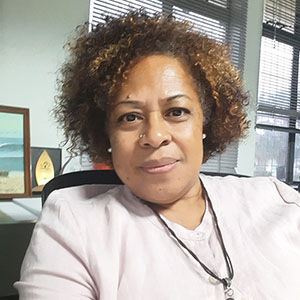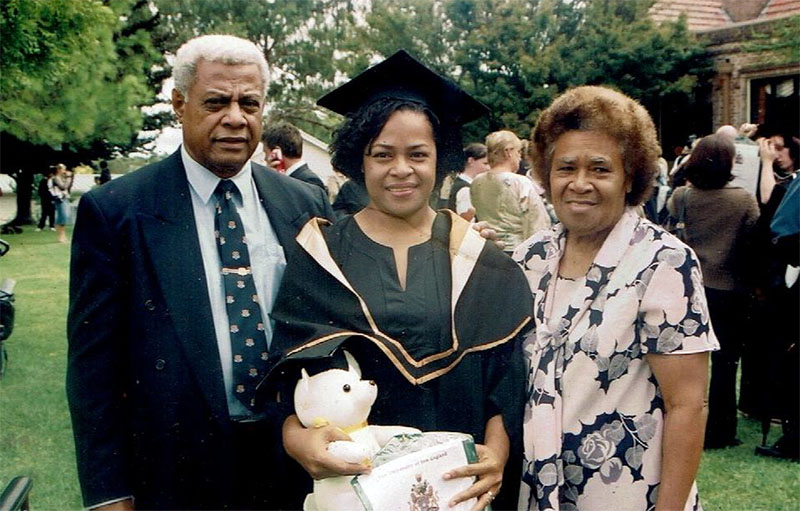Rejieli Cokanasiga-Taylor was recently appointed executive director of Women’s Fund Fiji, a charitable organisation dedicated to empowering women and advancing gender equality. She completed a Bachelor of Urban and Regional Planning at UNE, graduating in 2005, and reflects here on what learnings she has applied.
Tell us about your upbringing and the people who influenced you most.
I was brought up all over Fiji, mostly in urban centres, as both my parents are secondary teachers. However, they ensured that my siblings (three sisters and a brother) and I maintained our connections to our villages, relationships with our extended families and clan responsibilities, and that we understood our culture, heritage, lineage and history. As kids we looked forward to spending Christmas in the islands and being part of village events such as harvesting food and mat weaving. My recollection of the closeness of family, women’s roles, and the importance of contributing to community development had lasting impacts.
Both my parents are very well educated, encouraged us to dream big, and supported us in whatever we were interested in. My mother, a lecturer in Home Economics with the South Pacific Commission, first introduced me to community work and the empowerment of women. My dad, a geography teacher who later worked at the University of South Pacific, was head of our clan, and encouraged us to be of service, to maintain our heritage and meet our village obligations. I was taught to remain humble, help your fellow people whenever you can, and to work hard.
Why did you want to become an urban and regional planner?
I have always been interested in the land, environment and creative arts; in international travel, cities and urban development.
During my upbringing I carried out small projects within villages – landscaping and creative arts and design. I also travelled locally and internationally, and the cities and landscapes I visited fuelled that interest.
My Dad, who is also a careers teacher, encouraged me to apply to study at UNE. The course included a lot of the things I was always interested in, including urban design, geography, surveying, policy and environment law, social impact and transport planning.
What role has UNE played in you achieving your goals? What was the experience of studying at UNE like for you?
UNE has played a significant role. Studying at UNE was very fulfilling –personally and professionally. I have been equipped with a degree that is very scarce in Fiji and the Pacific region. I have also developed an understanding of matters that are important to the development of my nation and its communities.
Women graduates comprise only a minority of the planning workforce. Entering the field, I worked mostly with men, but the UNE course had given me the ability to work diligently, just as is expected of men, and with confidence.
The university and staff were very accommodating and helpful, especially the School of Humanities and Geography lecturers (including the late Associate Professor Chris Cunningham) and the International Office. I adapted easily to the lifestyle and become part of the UNE family. To this day, I still think of Armidale and UNE as a home away from home whenever I visit Australia. I came in as a lone Fijian student, but left as part of the UNE International family and Armidale community. The field trips to cities and other parts of Australia were a bonus.
What came next?
Returning to Fiji, it was difficult to get into the urban and regional space because there was little recognition of the profession. Our planners were contracted through the government and were all expats from Australia and New Zealand. I applied and was recruited as a high school teacher first. Then, three years later, I was employed as a Technical Officer with the Department of Town and Country Planning within the Ministry of Local Government.
What did you learn at UNE that you have been able to apply, in trying to make development “more meaningful, inclusive and accountable”?
The course taught me critical thinking, which I applied in all areas of my work and every sector I have worked in. The subject matter was all very useful and the three-month practical exposed me to real-life situations. With further education and work experience, I have made contributions to reviews of environmental and planning legislation, helped set up new environmental departments and planning and research units, as well as led teams responsible for approving major developments and planning schemes for towns and cities. I have also helped with community projects as a consultant advisor.
I believe any student graduating with a UNE degree is well set up to take on whatever challenges may come their way given the skillset, technical and professional knowledge and soft skills they gain. Above all, my UNE studies promoted essential leadership qualities.
 Executive Director of Women's Fund Fiji, Rejieli Cokanasiga-Taylor
Executive Director of Women's Fund Fiji, Rejieli Cokanasiga-Taylor
Describe your current responsibilities as executive director of the Women’s Fund (Fiji).
The Fiji Women’s Fund was implemented in 2017 under the Australian Government’s Pacific Women Shaping Pacific Development program. It provides funding and capacity development support to women’s groups, organisations and networks to expand their contributions to women’s empowerment and gender equality. Now known as the Women’s Fund (Fiji), it is locally owned and managed to resource Fiji’s feminist and women’s movement.
I am responsible for the leadership, management, and overall operation of the fund. I establish and maintain relationships with donors, the private sector and government agencies to identify opportunities for collaboration. We hope to drive inclusive and flexible models that are conscious of the intersectional realities of feminist social change and incorporate a vision for redistribution and decolonisation. Climate justice and humanitarian action are two of our priorities.
Why do the impacts of the climate crisis have a distinctly female face in the Pacific?
Climate change and its associated disasters have a significant impact on human security, health and the environment. They disproportionally affect women and girls, and especially Indigenous women. It is estimated that one-quarter of the economically active women in the Pacific work in agriculture and fisheries. Reduced crop yields due to climate change have devastating effects on their livelihoods, family health and nutrition.
But women also play a crucial role in climate change adaptation and mitigation. They understand what is needed to adapt to changing environmental conditions and to come up with practical solutions. However, they remain an untapped resource due to restricted land rights; a lack of access to financial resources, training and technology; and limited access to political decision-making. The impacts of climate change have important gender dimensions that shape how men and women experience or contribute and respond to climate-related security risks.
What kinds of gendered solutions would help to bring about greater equality, the achievement of Sustainable Development Goals and climate security?
Climate justice means treating everyone fairly when it comes to dealing with climate change. It is about making sure that resources are shared and that everyone has a say in how we respond to climate issues.
Gender solutions are a means for people of all genders to work together and make our world a better place for everyone. They rely on support from the privileged who hold power at the United Nations and via other national and global platforms. We must immediately make the necessary investment to close the massive gaps in women’s and girls’ access to and control of key resources that are crucial for the future of our island states, and our rural and remote communities.
Everyone has a role to play, including the private sector, to create just blue and green transitions and innovative solutions for the provision of clean energy. Our fund’s role is to drive change by increasing decent work and leadership for women in green sectors, increasing their representation in STEM fields, and leveraging increased national investments for women-led green businesses, technology and smart solutions.
Unfortunately, women continue to be under-represented in leadership positions and in decisions around climate policy. We must all strive to change this. Representation matters. We must ensure space and support for young women and girls who have been leading global and national climate movements and that they are resourced, valued and recognised. Because, ultimately, they are the greatest hope we have.


